

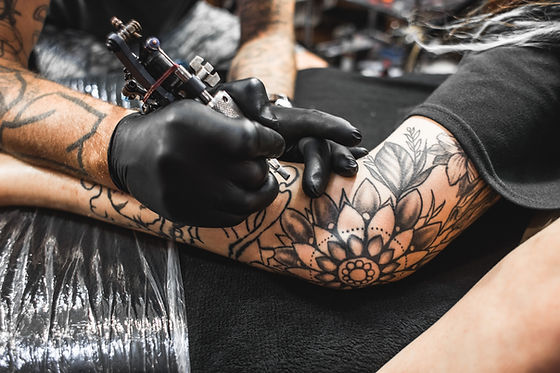

The aftercare is very important for proper tattoo healing
Cling Wrap
-
If your tattoo artist has wrapped your fresh ink in cling film, it's recommended to keep it on for a minimum of one hour, but it's essential not to exceed four hours.
-
Once you take off the wrap, delicately clean the tattoo by either wiping it with a damp paper towel or washing it during your shower.
-
After showering, gently pat the tattooed area dry using a clean towel.
-
Next, apply a specialized tattoo aftercare product to the fresh tattoo consistently until it has completely healed.
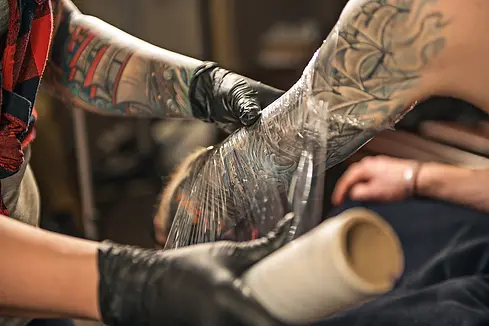
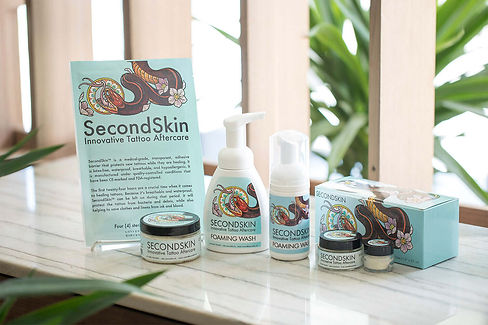
Second Skin
If your artist has applied a protective second skin, it's advised to keep it on for a duration of 5 to 10 days.
During this period, it's common for blood, residual ink, and plasma to accumulate under the second skin, leading to a bubbled appearance. This is a natural part of the healing process and will gradually diminish.
Upon removing the second skin, you might observe an imprint of the tattoo on it. This isn't a part of your actual tattoo but rather excess ink on the skin's surface.
Should you experience any irritation while wearing the second skin, it's recommended to remove it. Subsequently, you can start using an aftercare cream to promote optimal healing.
Tattoo Creams
When applying an aftercare product, apply only a thin layer.
If you notice any redness or irritation due to the cream, discontinue use immediately.
Always maintain cleanliness for your tattoo
Some over the counter creams that will help with the healing are Aquaphor, Aveeno and VERB Body Lotion.
There are some other tattoo creams out there just make sure to follow the directions on how much to apply.

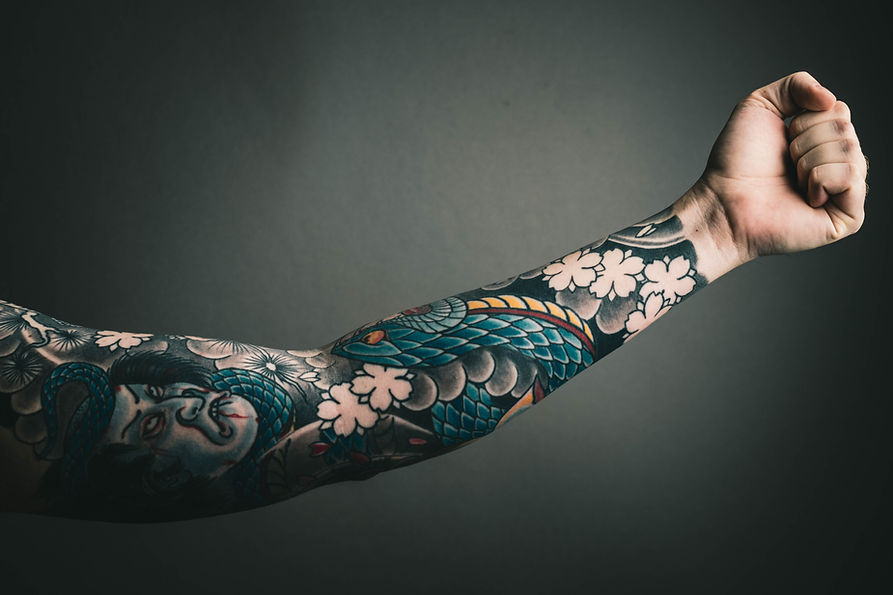

While You Heal
The healing process typically spans up to 14 days, though individual variations are common.
During the healing period, it's essential to avoid activities such as swimming, baths, and saunas to keep the tattoo dry.
When showering, limit the duration to under 15 minutes, and ensure the water temperature is comfortable for the freshly tattooed skin.
Steer clear of direct sun exposure and abstain from using fake tanning products.
Opt for loose-fitting clothing and avoid accessories that might rub against the new tattoo.
You can maintain your regular exercise routine, but be mindful of keeping the tattoo clean. If any discomfort arises during exercise, consider postponing until you feel at ease.
Resist the urge to scratch or pick at the tattoo. Itching is a normal part of the healing process, indicating progress.
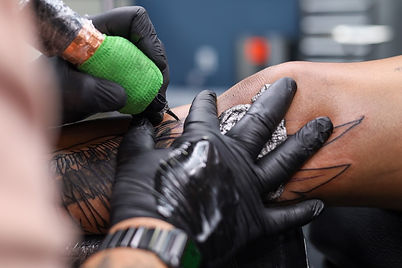
Proper tattoo aftercare is crucial for ensuring the longevity, vibrancy, and overall health of your new tattoo. Here are several key reasons why investing time and effort into proper aftercare is essential:
Preventing Infections: A fresh tattoo is essentially an open wound, and without proper care, it becomes susceptible to infections. Following aftercare instructions, which often include washing the tattoo gently and applying an appropriate healing ointment, helps create a barrier against harmful bacteria.
Preserving Colors and Detail: Tattoos can fade over time, especially if not cared for properly during the healing process. Following aftercare guidelines, such as avoiding exposure to direct sunlight and keeping the tattoo moisturized, helps preserve the vibrancy and clarity of the colors and details in your tattoo.
Minimizing Scarring: Proper aftercare helps minimize the risk of scarring. Scabs can form during the healing process, and picking at them can lead to permanent damage to the tattooed skin. Gentle care, including not scratching or picking at the tattoo, is essential for a smooth healing process.
Ensuring Proper Healing: Tattoos go through stages of healing, and each stage requires specific care. Following aftercare instructions ensures that your tattoo heals properly and consistently. This helps avoid complications such as uneven healing, excessive scabbing, or prolonged discomfort.
Preventing Allergic Reactions: Some people may be allergic to certain ointments or soaps. Proper aftercare involves using products recommended by the tattoo artist or dermatologist to minimize the risk of allergic reactions. This is crucial for individuals with sensitive skin or allergies.
Promoting Comfort: Tattoos can be uncomfortable during the initial healing period. Proper aftercare helps soothe the skin, reduce redness and swelling, and alleviate discomfort. This ensures a more pleasant experience during the healing process.
Maintaining the Artist's Work: Your tattoo artist has put time and effort into creating a unique piece of art on your skin. Proper aftercare is a way of showing respect for their work by ensuring that the tattoo heals as intended. This helps maintain the integrity of the artist's vision and craftsmanship.
In summary, proper tattoo aftercare is essential for both the short-term healing process and the long-term appearance of your tattoo. It's a critical step in protecting your investment, maintaining the beauty of the artwork, and ensuring your skin heals without complications. Always follow the aftercare instructions provided by your tattoo artist to achieve the best results.

